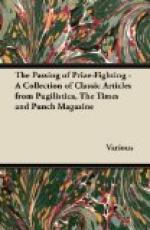* * * * *
From the official who is interested in officialdom to the Infantry officer who is interested in tactics, from the mechanical expert who can appreciate the technical details of diagrams to the child who revels in faultless photographs of hair-raising monsters ("I may read it, mother, mayn’t I, when I’ve unstickied my fingers?” was the way I heard it put), everybody, I think, will find plenty to attract him in Sir ALBERT STERN’S finely illustrated Tanks 1914-1918 (HODDER AND STOUGHTON). Tanks were born at Lincoln, and rightly so, for did not OLIVER CROMWELL’S Ironsides mostly come from this region?—and the main theme of this book is to show how much more formidable an obstacle they found in the files and registries of Whitehall than in the trenches and wire-entanglements of Flanders and France. Parents they had and sponsors innumerable. Practical soldiers and engineers were enthusiastic about them, and the Bosch quaked in his trenches or ran; but even so late as the autumn of 1917, after General FOCH (as he was then) had said, “You must make quantities and quantities; we must fight mechanically,” one stout little company of obscurantists bravely defied the creed of Juggernaut until the irresistible logic of its successes in the field crushed them remorselessly under the “creeping grip.” And that company, of course, according to Sir ALBERT STERN, was the British War Office.
* * * * *
Let me commend to you The Mask (METHUEN) as a craftsmanlike essay in imaginative realism; ruthlessly candid and self-revealing, but free from that tiresome obsession of the ultra-realists that everything that has ever happened is equally important in retrospect. The narrator, Vanya Gombarov, a Russian Jew, discourses reflectively and detachedly, as it were from behind a mask, to an English artist friend about his early childhood in his own land and the dismal adventures of the Gombarov family in that underworld of exploited and miserable aliens which is one of the root social problems of America. Very poignantly Mr. JOHN COURNOS makes you understand the import of the phrase so constantly on the lips of such victims of their own credulous hopes of El Dorado—“Woe to COLUMBUS!” The portrait of Vanya’s stepfather, brilliant, magnanimous, pursued by an AEschylean malignity of destiny, fills much of the foreground and is a quite masterly piece of work.




